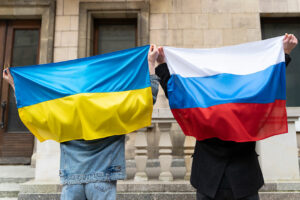
What if Russia wins in Ukraine? Ask Georgia
THERE’s been a lot of debate about what the future holds for Europe and its neighborhood if Russia’s invasion of Ukraine succeeds. We already know at least part of the answer, because it’s happening in Georgia.
This is the small Caucasus country where President Vladimir Putin first made clear he was willing to use force to reimpose a Russian sphere of control and influence. How that war began remains controversial, and I’ll get to the question later. What happened since shouldn’t have been.
On Monday evening, Bidzina Ivanishvili, a Georgian businessman who made his billions in Russia, gave a speech in which he accused a “global party of war” of trying to block his nation from asserting its freedom and sovereignty.
This is the same global party of war that used civil society non-governmental organizations, or NGOs, to foment Georgia’s 2003 Rose Revolution, according to Ivanishvili, who now runs his native country from an unelected position as chairman of the ruling Georgian Dream party. The uprising brought to power what he described as a puppet government that steeped the nation in crime and repression, and then forced Georgia into war with Russia in 2008. Later, this ill-defined global conspiracy forced Ukraine into wars with Moscow in 2014 and 2022.
Now, Ivanishvili said in his speech, those same people were trying to unseat his government and impose foreign values such as LGBTQ+ rights, because he refuses to open a second front against Russia. The NGOs now need to be dealt with, according to Ivanishvili, while members of the former government of President Mikheil Saakashvili — already in jail on what his lawyers say were trumped up charges — should be prosecuted for unspecified crimes.
This was, as the lifelong scholar of the Caucasus region Thomas de Waal put it on Tuesday, “an extremely dangerous speech that will chill anyone who cares about Georgia to the bone.”
It also amounted to a public declaration by Ivanishvili that he has sided with Moscow in its confrontation with the West, using the same paranoiac, unhinged language and gaslighting that Russian leaders spout daily. “It is completely clear that Bidzina Ivanishvili and ‘Georgian Dream’ have changed the foreign policy course from the West to Russia,” a group of 67 current and former Georgian diplomats wrote in a joint letter responding to the speech.
Twice now, Ivanishvili has persuaded the government to propose a law on foreign agents that’s very similar to the one Russia uses to suppress any nonprofit that receives grants from outside the country and doesn’t toe the Kremlin line. Such laws, aimed at suppressing civil society, are the gateway drugs of would-be autocrats, as they look to remove all institutions that could pose a risk to their hold on power.
Georgian Dream dominates the Parliament, but backed down from the attempt in March last year, after the bill triggered mass street protests. Russia, not coincidentally, was on the back foot in Ukraine at the time, recovering from two major battlefield defeats and looking stretched as even a regional superpower.
Now the government in Tbilisi is trying again, triggering mass protests, as well as formal criticism from Georgia’s Western allies. The European Union (EU) has said the law would be incompatible with membership, which opinion polls show some 80% of Georgians want. A bipartisan group of US senators expressed their disappointment in a letter, warning that the shift in policy could force the US to impose sanctions.
So what actually happened in Georgia? Saakashvili, a US-educated lawyer, had indeed worked for an NGO and led the Rose Revolution to power in 2003. The country was at the time a failed state, much of it controlled by criminal gangs and with three enclaves carved away by pro-Russia separatists; Ivanishvili, recently returned from Russia, gave no sign of opposing the uprising and even bankrolled some of Saakashvili’s reforms. The young new leader, for all his failings, quickly retrieved one lost territory, radically reduced corruption, collected taxes and left behind a functioning, investible state.
It wasn’t until 2008 that the two men became enemies. The North Atlantic Treaty Organization (NATO) had just said “no” to membership plans for Georgia and Ukraine, but offered a long-term promise that trespassed on what Putin saw as his backyard. The Russian military began to prepare fuel depots and rail infrastructure in Abkhazia and South Ossetia, its two remaining Georgian enclaves. When it started feeding unmarked tanks and soldiers into South Ossetia, in August, Saakashvili attempted a disastrous preemptive strike.
Saakashvili became the first Georgian leader to step down and allow a peaceful transfer of power when he lost elections in 2012. And for a while, it seemed Ivanishvili and Georgian Dream might offer a less impetuous path to the EU and NATO integration that the vast majority of the country wanted, as well as more protections for the rule of law.
But the country has instead been slipping on indices for corruption and freedom. Opponents of the government have been beaten or shot at. And this time, when Ivanishvili pushed for the repressive NGO law, Russia was on the offensive in Ukraine, taking territory as Kyiv ran out of ammunition for the front. Rather than back down again in the face of widespread demonstrations, Ivanishvili has now stepped out of the shadows to claim the foreign agent law as his own and the West as his enemy.
In doing so, Georgia’s strongman is flying in the face of what most of the population want, while obscuring the fact with appeals to conservative Georgians over gay rights. He’ll also doubtless enjoy backing from Moscow, which keeps troops in Abkhazia as well as South Ossetia, about a two-hour tank drive from the capital. The result is I have no idea how this will play out, but the impact of Putin’s military success in Ukraine is already clear; it’s turning the dreams of Russia’s neighboring populations into nightmares.
BLOOMBERG OPINION



